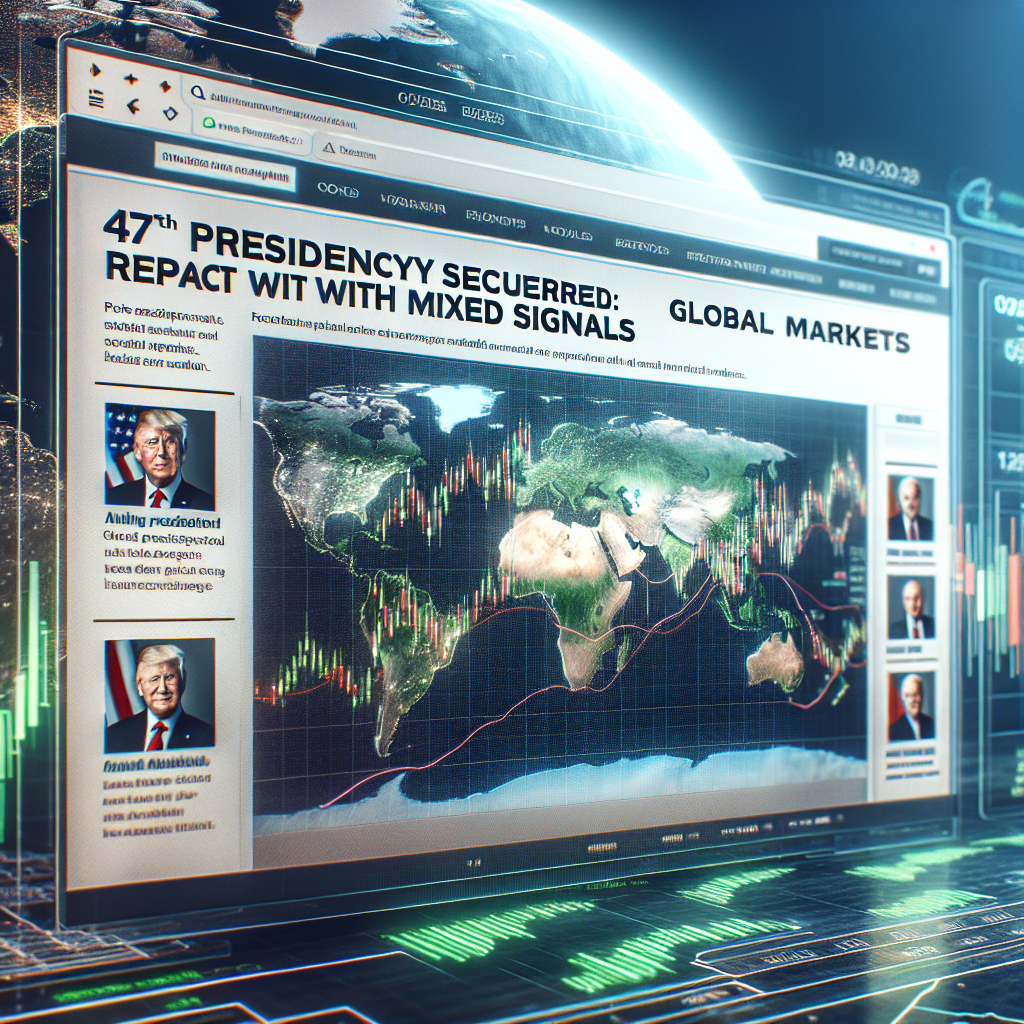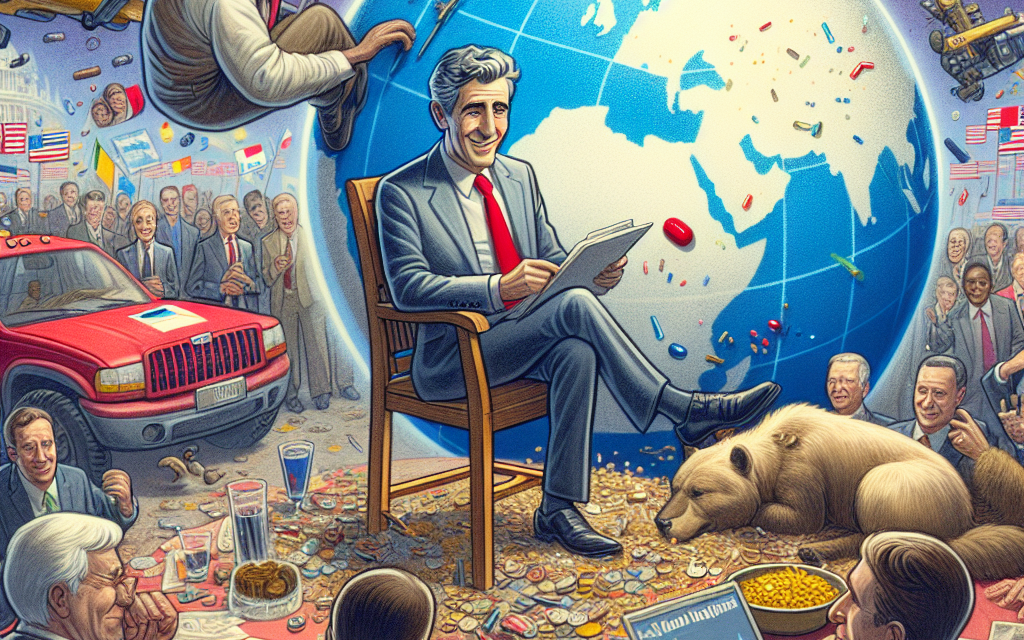“Trump’s 47th Presidency: A New Era Unfolds as Global Markets Waver.”
Introduction
In a historic turn of events, Donald Trump has secured the 47th presidency of the United States, marking a significant moment in American political history. This unexpected victory has sent ripples through global markets, eliciting a spectrum of reactions from investors and analysts worldwide. As the news broke, financial markets displayed mixed signals, reflecting both uncertainty and cautious optimism about the potential economic policies and international relations under Trump’s renewed leadership. While some sectors anticipate favorable conditions due to his pro-business stance, others remain wary of potential volatility and geopolitical tensions. This development sets the stage for a complex economic landscape as global markets adjust to the implications of Trump’s presidency.
Impact Of Trump’s 47th Presidency On Global Trade Policies
The election of Donald Trump as the 47th President of the United States has sent ripples through global markets, eliciting a spectrum of reactions from investors, policymakers, and international trade partners. As the world grapples with the implications of his return to the Oval Office, the focus has shifted to how his administration’s trade policies might reshape the global economic landscape. Trump’s previous tenure was marked by a series of protectionist measures, including tariffs on Chinese goods and a renegotiation of trade agreements, which left a lasting impact on international trade dynamics. Consequently, the anticipation of similar strategies has led to a cautious yet varied response from global markets.
In the immediate aftermath of Trump’s election victory, stock markets around the world exhibited mixed signals. While some indices experienced a surge, buoyed by expectations of business-friendly policies and deregulation, others displayed volatility, reflecting concerns over potential trade tensions. For instance, the U.S. stock market saw an initial uptick, driven by investor optimism about tax cuts and infrastructure spending. However, Asian markets, particularly those heavily reliant on exports to the United States, showed signs of apprehension, fearing a resurgence of trade barriers that could disrupt supply chains.
Transitioning to the realm of international trade policies, Trump’s presidency is expected to revisit the “America First” agenda, which prioritizes domestic industries and seeks to reduce trade deficits. This approach could lead to a reevaluation of existing trade agreements, such as the United States-Mexico-Canada Agreement (USMCA) and the Phase One trade deal with China. While some analysts argue that these renegotiations could yield more favorable terms for the U.S., others caution that they might provoke retaliatory measures from trading partners, potentially igniting trade wars that could hinder global economic growth.
Moreover, Trump’s stance on multilateral trade organizations, such as the World Trade Organization (WTO), is likely to influence his administration’s trade policies. During his previous term, Trump expressed skepticism about the effectiveness of such institutions, advocating for bilateral agreements instead. This perspective could lead to a shift away from multilateralism, prompting countries to seek alternative alliances and trade partnerships. As a result, the global trade order may witness a realignment, with nations exploring new avenues for economic collaboration.
In addition to these considerations, the impact of Trump’s presidency on global trade policies will also depend on the geopolitical landscape. Relations with key economic players, such as the European Union and China, will play a crucial role in shaping trade strategies. While some European leaders have expressed willingness to engage in dialogue with the new administration, others remain wary of potential disruptions to transatlantic trade ties. Similarly, China’s response to Trump’s election will be pivotal, as both nations navigate a complex web of economic interdependence and strategic rivalry.
In conclusion, the election of Donald Trump as the 47th President of the United States has introduced a new chapter in global trade policies, characterized by uncertainty and anticipation. As markets react with mixed signals, the world watches closely to discern the direction of U.S. trade strategies under Trump’s leadership. The potential for renegotiated agreements, shifts in multilateral engagement, and evolving geopolitical dynamics will undoubtedly shape the future of international trade, with far-reaching implications for the global economy. As such, stakeholders across the globe remain vigilant, preparing to adapt to the changing tides of global commerce.
How The 47th Presidency Affects U.S.-China Relations
The election of Donald Trump as the 47th President of the United States has sent ripples through global markets, with particular attention on the implications for U.S.-China relations. As the world’s two largest economies, the relationship between the United States and China is pivotal not only for bilateral trade but also for global economic stability. Trump’s return to the presidency has reignited discussions on trade policies, tariffs, and geopolitical strategies, all of which are crucial in shaping the future of U.S.-China relations.
During his previous tenure, Trump adopted a hardline stance on China, characterized by the imposition of tariffs and a focus on reducing the trade deficit. This approach led to a trade war that affected global supply chains and created uncertainty in international markets. With his re-election, there is speculation about whether Trump will continue with similar policies or adopt a new strategy. Investors and policymakers are closely monitoring his initial moves to gauge the direction of future U.S.-China interactions.
In the immediate aftermath of Trump’s election, global markets exhibited mixed reactions. While some sectors experienced volatility, others showed resilience, reflecting the complex nature of international trade dynamics. The technology sector, in particular, is on high alert, given its significant exposure to U.S.-China trade relations. Companies that rely on Chinese manufacturing or have substantial Chinese markets are assessing potential risks and opportunities under the new administration.
Moreover, Trump’s presidency could influence the ongoing technological rivalry between the two nations. Issues such as 5G technology, cybersecurity, and intellectual property rights are likely to remain at the forefront of U.S.-China discussions. The previous administration’s efforts to restrict Chinese technology companies’ access to U.S. markets may continue, potentially leading to further decoupling in the tech sector. This could have far-reaching implications for global innovation and technological advancement.
In addition to trade and technology, Trump’s presidency may also impact diplomatic relations and geopolitical strategies. The South China Sea, Taiwan, and human rights issues are perennial points of contention that could see renewed focus. Trump’s approach to these sensitive topics will be crucial in determining the overall tone of U.S.-China relations. A more confrontational stance could exacerbate tensions, while a diplomatic approach might pave the way for constructive dialogue.
Furthermore, the global community is keenly observing how Trump’s policies will affect multilateral institutions and international agreements. His previous withdrawal from the Trans-Pacific Partnership and skepticism towards the World Trade Organization have raised questions about the future of global trade governance. A shift in U.S. policy could influence China’s role in these institutions and its relationships with other countries.
In conclusion, Trump’s election as the 47th President of the United States presents both challenges and opportunities for U.S.-China relations. The global markets’ mixed reactions underscore the uncertainty surrounding future policies and their potential impact on international trade and diplomacy. As both nations navigate this complex landscape, the decisions made in the coming months will be critical in shaping not only bilateral relations but also the broader global economic and geopolitical environment. Observers worldwide will be watching closely to see how this pivotal relationship evolves under Trump’s leadership, with the hope that it will lead to a more stable and prosperous global order.
Global Stock Markets: Initial Reactions To Trump’s 47th Presidency
The election of Donald Trump as the 47th President of the United States has sent ripples through global stock markets, eliciting a spectrum of reactions from investors and analysts alike. As the news broke, markets around the world began to respond, reflecting a complex mix of optimism, uncertainty, and caution. This multifaceted reaction underscores the intricate relationship between political developments and economic expectations.
In the immediate aftermath of Trump’s victory, U.S. stock futures exhibited a volatile pattern. Initially, there was a sharp decline, reminiscent of the market’s response to Trump’s first election in 2016. However, this initial dip was quickly followed by a rebound, as investors recalibrated their expectations based on Trump’s economic policies, which historically have included tax cuts and deregulation. These policies are generally perceived as business-friendly, potentially fostering an environment conducive to corporate growth and profitability.
Across the Atlantic, European markets displayed a more tempered response. Major indices such as the FTSE 100 and the DAX experienced modest fluctuations, reflecting a cautious optimism. European investors are particularly attuned to Trump’s stance on international trade and foreign policy, which could have significant implications for transatlantic economic relations. The potential for renegotiated trade agreements or shifts in diplomatic ties adds a layer of complexity to the market’s outlook.
Meanwhile, in Asia, the reaction was notably mixed. Japanese markets, for instance, saw a slight uptick, buoyed by the prospect of continued strong ties between the U.S. and Japan. Conversely, Chinese markets were more subdued, as investors weighed the potential for renewed trade tensions. Trump’s previous tenure was marked by a contentious trade war with China, and the possibility of its resurgence remains a point of concern for market participants.
Emerging markets, too, are navigating this new political landscape with a degree of caution. Countries with significant economic ties to the U.S. are particularly sensitive to changes in American trade policy. The potential for shifts in tariffs or trade agreements could have profound effects on these economies, influencing everything from currency valuations to export levels.
In addition to regional market reactions, specific sectors are also experiencing varied impacts. The energy sector, for instance, is closely monitoring Trump’s policies on fossil fuels and renewable energy. His administration’s approach could significantly influence oil prices and the broader energy market. Similarly, the technology sector is keeping a watchful eye on potential regulatory changes that could affect innovation and competition.
As global markets continue to digest the implications of Trump’s presidency, investors are likely to remain vigilant, closely monitoring policy announcements and geopolitical developments. The interplay between political decisions and economic outcomes will be crucial in shaping market trajectories in the coming months.
In conclusion, the election of Donald Trump as the 47th President of the United States has elicited a complex array of responses from global stock markets. While some investors are optimistic about the potential for pro-business policies, others remain cautious, wary of the uncertainties that accompany any significant political transition. As the world watches closely, the coming weeks and months will be pivotal in determining how markets ultimately adjust to this new chapter in American leadership.
Currency Fluctuations: The Dollar’s Response To Trump’s Return

The recent election of Donald Trump as the 47th President of the United States has sent ripples through global markets, with particular attention on currency fluctuations and the response of the U.S. dollar. As investors and analysts attempt to navigate the implications of Trump’s return to the White House, the dollar’s performance has become a focal point of economic discourse. In the immediate aftermath of the election, the dollar experienced a surge, reflecting initial investor optimism about potential pro-business policies and tax reforms that could stimulate economic growth. However, this initial boost was tempered by concerns over Trump’s trade policies and geopolitical strategies, which have historically introduced elements of uncertainty into the global economic landscape.
In the days following the election, the dollar’s value exhibited volatility, with fluctuations driven by both domestic and international factors. Domestically, the anticipation of fiscal stimulus measures and deregulation under Trump’s administration has fueled expectations of accelerated economic growth, potentially leading to higher interest rates. This prospect has traditionally bolstered the dollar, as higher interest rates tend to attract foreign investment. However, the potential for inflationary pressures and the Federal Reserve’s response to such dynamics add layers of complexity to the currency’s trajectory.
Internationally, the dollar’s performance is influenced by the reactions of other major economies to Trump’s policies. For instance, the potential for trade tensions with China and the European Union could lead to retaliatory measures, impacting global trade flows and currency valuations. Moreover, Trump’s stance on international agreements and alliances may alter geopolitical relationships, further affecting market stability. As a result, investors are closely monitoring developments in U.S. foreign policy, as these could have significant implications for the dollar’s strength relative to other currencies.
In Europe, the euro has shown resilience despite the dollar’s initial surge, as the European Central Bank continues to navigate its own economic challenges. The interplay between U.S. and European monetary policies remains a critical factor in determining the euro-dollar exchange rate. Meanwhile, in Asia, currencies such as the Japanese yen and Chinese yuan have experienced their own fluctuations, influenced by both regional economic conditions and the broader impact of U.S. policy shifts.
As markets continue to digest the implications of Trump’s presidency, the role of central banks becomes increasingly pivotal. The Federal Reserve, in particular, faces the challenge of balancing domestic economic objectives with the need to maintain global financial stability. Any signals from the Fed regarding interest rate adjustments or monetary policy shifts are likely to have immediate effects on the dollar’s value.
In conclusion, the return of Donald Trump to the presidency has introduced a complex set of variables into the global economic equation, with the U.S. dollar at the center of this intricate web. While initial optimism about potential economic growth has buoyed the dollar, ongoing uncertainties related to trade policies and geopolitical strategies present challenges that could lead to further currency fluctuations. As investors and policymakers alike grapple with these dynamics, the coming months will be crucial in determining the dollar’s path and its broader impact on global markets. The interplay of domestic policies, international relations, and central bank actions will continue to shape the currency landscape, underscoring the need for vigilance and adaptability in an ever-evolving economic environment.
European Union’s Economic Strategy Amid Trump’s 47th Term
As Donald Trump secures his position as the 47th President of the United States, the global markets have responded with a variety of signals, reflecting both optimism and uncertainty. Within this context, the European Union finds itself at a critical juncture, needing to reassess its economic strategy in light of potential shifts in U.S. policy. The EU’s economic strategy, already under pressure from internal challenges such as Brexit and the ongoing energy crisis, must now adapt to the implications of Trump’s presidency, which could influence transatlantic trade relations, regulatory standards, and geopolitical alliances.
To begin with, Trump’s presidency is likely to bring about changes in trade policies, which could have significant repercussions for the EU. During his previous terms, Trump was known for his protectionist stance, advocating for tariffs and renegotiating trade agreements to favor American interests. Should similar policies be pursued, the EU may face increased tariffs on its exports to the U.S., potentially affecting key industries such as automotive and agriculture. Consequently, the EU must consider diversifying its trade partnerships and strengthening its internal market to mitigate potential disruptions.
Moreover, the EU’s economic strategy must also account for possible shifts in regulatory standards. Trump’s administration has historically favored deregulation, particularly in sectors such as finance and environmental protection. This approach could lead to a divergence in regulatory frameworks between the U.S. and the EU, complicating transatlantic business operations. To address this, the EU may need to reinforce its regulatory autonomy while seeking common ground with the U.S. on critical issues such as digital trade and data privacy.
In addition to trade and regulatory concerns, the EU must navigate the geopolitical landscape that Trump’s presidency may shape. His previous terms were marked by a transactional approach to international relations, which often led to strained alliances. The EU, therefore, faces the challenge of maintaining a balanced relationship with the U.S. while also asserting its strategic autonomy. This could involve enhancing its defense capabilities and fostering closer ties with other global powers, such as China and India, to ensure a multipolar world order.
Furthermore, the EU’s economic strategy must also consider the potential impact of Trump’s presidency on global financial markets. The initial reaction to his election has been mixed, with some investors expressing confidence in his pro-business policies, while others remain cautious about the potential for increased volatility. The EU must remain vigilant, monitoring market trends and adjusting its monetary and fiscal policies accordingly to maintain economic stability.
In conclusion, Trump’s 47th presidency presents both challenges and opportunities for the European Union’s economic strategy. By proactively addressing potential trade disruptions, regulatory divergences, and geopolitical shifts, the EU can position itself to navigate this new era effectively. As the global landscape continues to evolve, the EU’s ability to adapt and innovate will be crucial in ensuring its economic resilience and maintaining its influence on the world stage. Through strategic foresight and collaboration, the EU can turn the uncertainties of Trump’s presidency into opportunities for growth and development, ultimately strengthening its role as a key player in the global economy.
Emerging Markets: Opportunities And Challenges Under Trump’s Leadership
The election of Donald Trump as the 47th President of the United States has sent ripples through global markets, eliciting a spectrum of reactions from investors and policymakers alike. As the world grapples with the implications of his leadership, emerging markets find themselves at a crossroads, facing both opportunities and challenges. The initial response from these markets has been mixed, reflecting a complex interplay of optimism and caution.
To begin with, Trump’s presidency is expected to bring about significant shifts in U.S. economic policy, which could have far-reaching effects on emerging markets. His administration’s focus on deregulation and tax cuts may stimulate economic growth in the United States, potentially increasing demand for exports from emerging economies. This could provide a much-needed boost to countries reliant on trade with the U.S., offering them an opportunity to expand their markets and enhance economic growth. Moreover, Trump’s emphasis on infrastructure development could lead to increased demand for raw materials, benefiting resource-rich emerging markets.
However, alongside these opportunities, there are notable challenges that emerging markets must navigate. Trump’s protectionist trade policies, including potential tariffs and renegotiations of trade agreements, could pose significant risks. Countries heavily dependent on exports to the U.S. may find themselves vulnerable to shifts in trade dynamics, which could disrupt their economic stability. Furthermore, the possibility of tighter immigration policies could impact remittances, a vital source of income for many developing nations.
In addition to trade concerns, emerging markets must also contend with the potential volatility in global financial markets. Trump’s presidency has already led to fluctuations in currency values, with the U.S. dollar experiencing periods of strength. A strong dollar can pose challenges for emerging markets with significant dollar-denominated debt, as it increases the cost of servicing these obligations. This could strain national budgets and lead to financial instability in countries with weaker economic fundamentals.
Despite these challenges, some emerging markets may find opportunities in diversifying their economic partnerships. As the U.S. potentially becomes more insular, countries in Asia, Africa, and Latin America might seek to strengthen ties with other global powers such as China and the European Union. This could lead to new trade agreements and investment opportunities, fostering economic resilience and reducing dependency on the U.S. market.
Furthermore, Trump’s presidency may prompt emerging markets to focus on domestic reforms to enhance their competitiveness. By improving governance, infrastructure, and business environments, these countries can attract foreign investment and stimulate economic growth. This inward-looking approach could help mitigate the risks associated with external shocks and create a more sustainable economic model.
In conclusion, the election of Donald Trump as the 47th President of the United States presents a complex landscape for emerging markets, characterized by both opportunities and challenges. While his policies may offer avenues for growth through increased trade and investment, they also pose risks related to protectionism and financial volatility. As these markets navigate this new era, their ability to adapt and innovate will be crucial in determining their success. By leveraging opportunities for diversification and domestic reform, emerging economies can position themselves to thrive under Trump’s leadership, despite the uncertainties that lie ahead.
The Future Of International Alliances With Trump’s 47th Presidency
The election of Donald Trump as the 47th President of the United States has sent ripples through the global political landscape, prompting a reevaluation of international alliances and economic strategies. As the world grapples with the implications of his return to the White House, global markets have reacted with mixed signals, reflecting both uncertainty and cautious optimism. This development marks a significant moment in international relations, as countries reassess their diplomatic and economic ties with the United States under Trump’s leadership.
In the immediate aftermath of Trump’s election victory, stock markets around the world exhibited volatility, with some indices experiencing sharp declines while others showed resilience. Investors are keenly aware that Trump’s presidency could herald a shift in U.S. foreign policy, potentially affecting trade agreements, military alliances, and diplomatic relations. Consequently, market participants are closely monitoring any policy announcements that could provide insight into the administration’s priorities.
One of the key areas of concern is the future of international trade agreements. During his previous tenure, Trump adopted a protectionist stance, withdrawing from the Trans-Pacific Partnership and renegotiating the North American Free Trade Agreement, resulting in the United States-Mexico-Canada Agreement. As such, there is widespread speculation about whether Trump will pursue similar policies this time around. Countries heavily reliant on trade with the United States are particularly anxious about potential tariffs and trade barriers that could disrupt existing economic relationships.
Moreover, Trump’s approach to international alliances, such as NATO, is under scrutiny. His past criticisms of NATO members for not meeting defense spending commitments raised questions about the future of the alliance. As Trump assumes office once again, NATO allies are likely to seek reassurances about the United States’ commitment to collective defense. The potential for a recalibration of U.S. involvement in global security arrangements could have far-reaching implications for international stability.
In addition to trade and security, environmental policies are also expected to be a focal point of Trump’s presidency. His previous withdrawal from the Paris Agreement signaled a departure from global efforts to combat climate change. As the world faces increasing environmental challenges, the international community is eager to understand how Trump’s policies will align with global sustainability goals. The response of global markets to any shifts in environmental policy will be closely watched, as businesses and investors assess the potential impact on industries ranging from energy to agriculture.
Despite the uncertainties, some sectors have responded positively to Trump’s election. Industries that stand to benefit from deregulation and tax reforms, such as finance and energy, have seen a boost in investor confidence. This optimism is tempered by the recognition that policy changes could take time to materialize and may face opposition both domestically and internationally.
In conclusion, Trump’s election as the 47th President of the United States has introduced a new dynamic into the realm of international alliances and economic relations. As global markets react with mixed signals, the world is poised to witness how Trump’s policies will shape the future of international cooperation. The coming months will be crucial in determining the trajectory of U.S. foreign policy and its impact on global markets, as countries navigate the complexities of engaging with a Trump-led administration. The international community remains vigilant, ready to adapt to the evolving geopolitical landscape and its implications for global economic stability.
Q&A
1. **Question:** How did global stock markets react to Trump’s 47th presidency?
– **Answer:** Global stock markets showed mixed reactions, with some indices rising due to anticipated pro-business policies, while others fell due to geopolitical uncertainties.
2. **Question:** What sectors experienced growth following Trump’s election?
– **Answer:** The energy and defense sectors experienced growth, driven by expectations of favorable policies and increased government spending.
3. **Question:** How did the currency markets respond to the news?
– **Answer:** The U.S. dollar strengthened against several major currencies, reflecting investor confidence in the U.S. economy under Trump’s leadership.
4. **Question:** What was the reaction of the European markets?
– **Answer:** European markets were cautious, with some indices experiencing volatility due to concerns over potential trade tensions and policy shifts.
5. **Question:** How did Asian markets respond to Trump’s presidency?
– **Answer:** Asian markets had a mixed response, with some countries benefiting from potential trade deals, while others were wary of protectionist policies.
6. **Question:** What impact did Trump’s presidency have on commodity prices?
– **Answer:** Commodity prices, particularly oil and gold, saw fluctuations as investors weighed the potential for increased U.S. production and geopolitical risks.
7. **Question:** How did investors perceive the long-term economic outlook under Trump’s presidency?
– **Answer:** Investors were divided, with some optimistic about tax cuts and deregulation boosting growth, while others were concerned about fiscal deficits and international relations.
Conclusion
Donald Trump’s securing of the 47th presidency has elicited a mixed response from global markets, reflecting uncertainty and varied expectations about his economic policies. While some sectors anticipate favorable conditions due to potential tax cuts and deregulation, others express concern over possible trade tensions and geopolitical instability. This divergence in market reactions underscores the complexity and unpredictability of Trump’s economic impact on both domestic and international fronts. As investors and policymakers navigate this new political landscape, the global economy may experience volatility until clearer policy directions are established.





